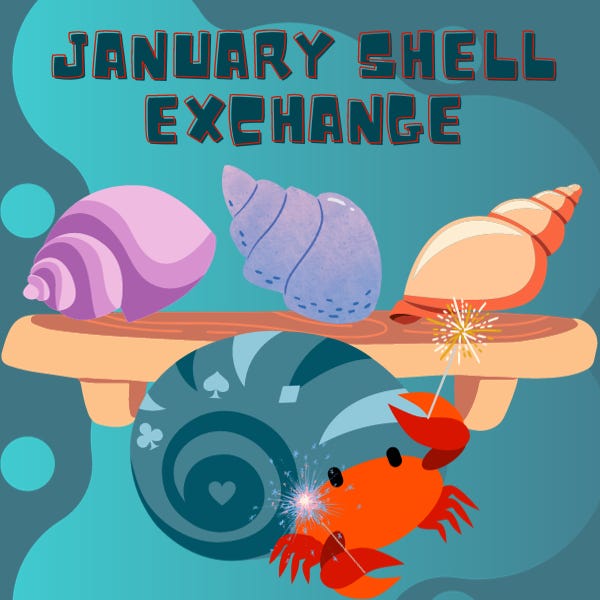Welcome to the January Shell Exchange—the very first of the new year!
Midway through each month, I drop a list of recommended reads. I try to feature winning hermit crab essays (🦀) when possible. But those charming crabbies aren’t always easy to find. So I also make it a point to share pieces on invisible illness.
If you come across an essay or article I haven’t mentioned that you feel warrants attention, drop the link in the comments, and I’ll add it to the rotation next month.
1. “Suicides” by Aishah Simone from The Audacity
“But despair is not something that my family has ever acknowledged. Indeed, what I now recognize as depression was not an emotion spoken about by anyone when I was growing up, especially not by Black people. My family refused to treat ‘feeling bad’ as anything abnormal; they saw it as an intrinsic part of the Black experience. Indeed, ‘feeling bad’ was better than ‘feeling good,’ lest life decide you’d gotten too big for your britches. Happiness was suspect. Contentment, downright rebellious.”
2. “You Talk Real Good” by Alison Stine from First Person Singular
“I didn’t meet another hearing impaired person, or at least one who disclosed to me, until I was in high school. The reality is, I don’t know what I am. Hard of hearing is perhaps a medically correct term, but for many people, it incorrectly conjures up the image of someone who is old and infirm. Am I disabled or not? Do I count or am I counted out?”
3. “Cardiac psychologists are pushing to protect heart patients’ often over-overlooked mental health” by Gina Ryder from STAT
“In the 1980s, public health specialists found type A personalities actually survived their heart attacks “better” than those with type B, results that stirred controversy in the field. Over the last 40 years, the landscape shifted from emphasizing the health risks of type A personalities to looking at the impact of other psychosocial factors — such as anxiety, depression, stress, and loneliness — on the heart.”
4. “My Unraveling: I had my health. I had a job. And then, abruptly, I didn’t.” by Tom Scocca from The Intelligencer
“My feet kept swelling, day by day, until my pink ankles looked like deli hams and I started using a butter knife as a shoehorn. I’d reluctantly spent some money to order a new pair of canvas sneakers, off-white, for the spring and summer, and I left them in the box, unable to face the thought of jamming my distended feet into them. The pins and needles spread to both arms, like I’d slept on them funny, except the sensation lasted all day.”
5. “Motherhood is Antarctica: On the Underexplored Landscape of Postpartum Loneliness” by Marie Doezema from LitHub
“It takes a similar courage to write about motherhood, whether from the perspective of a poet or a scientist; to consider it worthy of study, to seek truth and understanding, to think of motherhood, like Antarctica, as a vast and under-explored continent. There has been an increasing amount of literature in recent years, both non-fiction and fiction, that explores the experience of motherhood in a bold, new way; perspectives that once would have been considered shameful, that still are by some.”
6. “Ancient DNA reveals origins of multiple sclerosis in Europe” by Sara Reardon from Nature
“Today, multiple sclerosis is a devastating disease caused by an overactive immune system attacking the nervous system. But that superpowered immune system, or genetic variants associated with it, could have helped ancient people to survive plagues and common pathogens, Willerslev says. ‘That’s the best explanation we can come up with.’”
7. “Women With Depression During or After Pregnancy Face Greater Suicide Risk, Even Years Later” by Pam Belluck from The New York Times
“The average age at which women experienced perinatal depression was 31. They were more likely than those without the illness to live alone, to have lower income and less formal education, to have smoked recently and to have not given birth before, among other characteristics, the researchers reported.”





